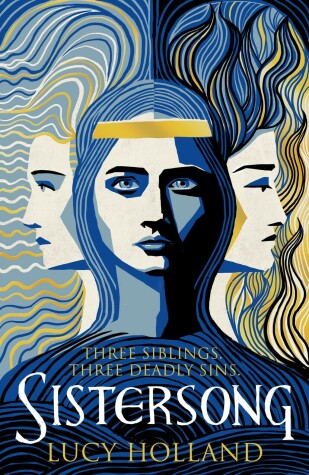Reviewed by Witty and Sarcastic Bookclub on
Sistersong is a study in contradictions. Beautiful but brutal. Sad but hopeful. Large but intensely personal. I suppose that it only makes sense that my impressions would be rather contradictory as well.
The book tells a tale of change, of the way a single choice can turn a world on its head. Riva, Keyne, and Sinne are three siblings, each with their own struggles and desires. Keyne wants to be accepted for who he is, but is struggling against the preconceptions of others. Riva considers herself “broken” after a childhood accident and it colors her choices. Sinne longs for something more than her daily routine. Together, these three might either lose- or save- their people and themselves.
The tone was set from the get-go. The reader is introduced to a land and time that is divided, with older traditions being assimilated into the newer ones started by the arrival of Christianity. There was an interesting give and take between the old and the new, with the struggle being represented by two very different and distinct characters: Mrydhin, magician of legend; and Gildas, the Christian priest. While I found the struggle between the old and the new interesting, I was also a little disappointed. The changing of religions and cultures can be fascinating, but instead of a nuanced exploration of the meaning behind the changes and the possible ramifications, Gildas was reduced to a typical villain. I would have liked to see a more complex range of motivations for his actions, instead of seeing the old magic as “good” and the new religion as “bad”. That being said, Mrydhin was written brilliantly. I loved his world-weary wisdom and the way he put people and things into position before letting everything play out as it willed. He manipulated those around him like he was playing a game of chess and I was completely on board with it.
The book was told from the points of view of the three siblings. First, there was Sinne. Sinne was beautiful, stubborn, and capricious. She also had the ability to see bits and pieces of the future. I wanted to shake her ninety percent of the time. I believe that is the reaction the author was going for, and she succeeded magnificently. I refrained from yelling at a fictional character, but it was touch and go there for a bit. Her storyline ended up being incredibly important, and she was a catalyst for some of the biggest moments in the book, so I can’t resent her too much.
Keyne wanted to be seen and accepted. His storyline was one I really enjoyed, as he grew in confidence and knowledge. His was the most fantasy-esque part of the book, with battles, sieges, and magic. He added immensely to the feel to Sistersong, showing magic always lurking just under the surface and around corners.
Then, there was Riva. Riva was horribly burned in an accident as a child. As a result, she only had the use of one hand. She grew up accepting the lie that she was lesser than, a broken thing to be pitied. All of her choices revolve around this belief. I felt sad for her, while at the same time being frustrated at the way her insecurities were easily exploited.
Taken separately, none of these characters would be able to carry a story of this magnitude. After all, the fate of a kingdom lies in the balance. Together, a tale is told that is captivating. I have read that it is a loose retelling of an old ballad called ‘The Twa Sisters’. I’ve never heard the ballad before, but Sistersong does have a songlike quality to it. It flowed well and ended in a way that was both satisfying and a little sad.
The book moved along at a good pace, starting slowly and building up to a breathtaking climax. I had a “holy whoa” moment when the reason behind the title was explained. I did not see that coming. While I didn’t love Sistersong (mainly because of the way the struggle between older beliefs and new was simplified), I did find myself eagerly picking it up whenever I had the chance. It was enthralling and utterly unique.
I recommend Sistersong to readers who have grown up on Arthurian myths or who like hints of magic shining in-between the struggle to survive.
https://wittyandsarcasticbookclub.home.blog/2021/09/19/sistersong-by-lucy-holland/
Reading updates
- Started reading
- 15 September, 2021: Finished reading
- 15 September, 2021: Reviewed
